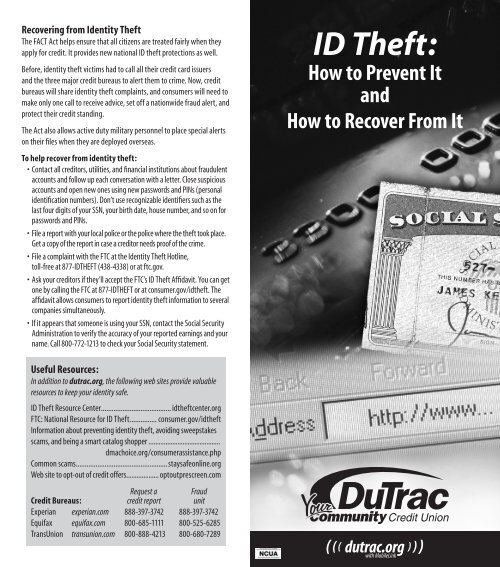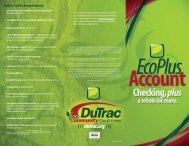Download a "Preventing ID Theft" - DuTrac Community Credit Union
Download a "Preventing ID Theft" - DuTrac Community Credit Union
Download a "Preventing ID Theft" - DuTrac Community Credit Union
- No tags were found...
Create successful ePaper yourself
Turn your PDF publications into a flip-book with our unique Google optimized e-Paper software.
Recovering from Identity Theft<br />
The FACT Act helps ensure that all citizens are treated fairly when they<br />
apply for credit. It provides new national <strong>ID</strong> theft protections as well.<br />
Before, identity theft victims had to call all their credit card issuers<br />
and the three major credit bureaus to alert them to crime. Now, credit<br />
bureaus will share identity theft complaints, and consumers will need to<br />
make only one call to receive advice, set off a nationwide fraud alert, and<br />
protect their credit standing.<br />
The Act also allows active duty military personnel to place special alerts<br />
on their files when they are deployed overseas.<br />
To help recover from identity theft:<br />
• Contact all creditors, utilities, and financial institutions about fraudulent<br />
accounts and follow up each conversation with a letter. Close suspicious<br />
accounts and open new ones using new passwords and PINs (personal<br />
identification numbers). Don’t use recognizable identifiers such as the<br />
last four digits of your SSN, your birth date, house number, and so on for<br />
passwords and PINs.<br />
• File a report with your local police or the police where the theft took place.<br />
Get a copy of the report in case a creditor needs proof of the crime.<br />
• File a complaint with the FTC at the Identity Theft Hotline,<br />
toll-free at 877-<strong>ID</strong>THEFT (438-4338) or at ftc.gov.<br />
• Ask your creditors if they’ll accept the FTC’s <strong>ID</strong> Theft Affidavit. You can get<br />
one by calling the FTC at 877-<strong>ID</strong>THEFT or at consumer.gov/idtheft. The<br />
affidavit allows consumers to report identity theft information to several<br />
companies simultaneously.<br />
• If it appears that someone is using your SSN, contact the Social Security<br />
Administration to verify the accuracy of your reported earnings and your<br />
name. Call 800-772-1213 to check your Social Security statement.<br />
<strong>ID</strong> Theft:<br />
How to Prevent It<br />
and<br />
How to Recover From It<br />
Useful Resources:<br />
In addition to dutrac.org, the following web sites provide valuable<br />
resources to keep your identity safe.<br />
<strong>ID</strong> Theft Resource Center....................................... idtheftcenter.org<br />
FTC: National Resource for <strong>ID</strong> Theft............... consumer.gov/idtheft<br />
Information about preventing identity theft, avoiding sweepstakes<br />
scams, and being a smart catalog shopper ..........................................<br />
dmachoice.org/consumerassistance.php<br />
Common scams...................................................staysafeonline.org<br />
Web site to opt-out of credit offers................... optoutprescreen.com<br />
Request a<br />
Fraud<br />
<strong>Credit</strong> Bureaus: credit report unit<br />
Experian experian.com 888-397-3742 888-397-3742<br />
Equifax equifax.com 800-685-1111 800-525-6285<br />
Trans<strong>Union</strong> transunion.com 800-888-4213 800-680-7289
Identity theft occurs when a thief obtains – and illegally uses – your<br />
identifying information, such as your Social Security number (SSN),<br />
your checking account number or your credit card information<br />
to open new credit accounts and apply for loans in your name. If<br />
you’re a victim, reclaiming your good name can take years and can<br />
be expensive. According to a 2009 Identity Fraud Survey Report by<br />
Javelin Strategy and Research, individual victims said perpetrators<br />
stole, on average, $4,849 in cash, goods, or services in 2008.<br />
An <strong>ID</strong> thief often is someone you know who strikes by redirecting<br />
mail, stealing sales receipts, or shoulder surfing – peeking over<br />
people’s shoulders while they’re at the ATM. Technology just expands<br />
the opportunities.<br />
Spoofing, Spamming, and Phishing<br />
Identity thieves aren’t only picking sales receipts and credit card<br />
offers out of trash cans to steal your information. They’re using highly<br />
technical methods. They spoof, spam, and phish.<br />
Spoofers create a replica of an existing web page to fool a user into<br />
submitting personal, financial, or password data.<br />
Make sure the web sites you visit show a padlock on your browser<br />
window – the padlock signifies the use of SSL (secure sockets layer)<br />
technology. By convention, URLs (uniform resource locators) that<br />
require a safe connection start with https: or s-http:.<br />
Spammers send unsolicited e-mail indiscriminately to multiple<br />
mailing lists, individuals, or newsgroups. These e-mails include<br />
advertisements, viruses, and hoaxes. Report spam by sending an<br />
e-mail to the FTC at spam@uce.gov.<br />
Phishers create and use e-mails and web sites – designed to look<br />
like e-mails and web sites of well-known legitimate businesses,<br />
financial institutions, and government agencies – to deceive users<br />
into disclosing financial institution and account information or other<br />
personal data such as usernames and passwords.<br />
<strong>Preventing</strong> Identity Theft<br />
• Before revealing personal financial information, find out whom<br />
you’re dealing with, how the information will be used, and if it will be<br />
shared with others.<br />
• Only give your SSN when it’s absolutely necessary (see box, next<br />
page). Ask if you can use another identifier, such as a driver’s license,<br />
instead. And don’t carry your Social Security card in your wallet unless<br />
you need it that day.<br />
• Keep items with personal information in a safe place and either shred<br />
them or tear them up when you don’t need them anymore. Dispose<br />
of checking/share draft copies and statements, receipts with a credit<br />
card imprint, insurance forms, expired credit cards, savings and<br />
investment account statements, and credit card offers the same way.<br />
• Order a copy of your credit report from each credit-reporting agency<br />
every year. The Fair and Accurate <strong>Credit</strong> Transactions Act (FACT Act)<br />
of 2003 requires each major credit bureau to provide one free credit<br />
report annually to consumers who request a copy (call 877-322-8228<br />
or visit annualcreditreport.com).<br />
• Verify that your credit report is accurate and that it includes only<br />
activities you’ve authorized.<br />
• Look over your credit card and credit union statements each month<br />
for unauthorized charges or suspicious activity.<br />
• Photocopy financial cards and insurance cards you carry in your wallet<br />
(front and back) and keep copies in a safe place; if your wallet is lost or<br />
stolen, you can promptly and accurately report the loss.<br />
• Consider the information you’re supplying on entries to win a car,<br />
shopping spree, and so on. To win, information such as your age or<br />
income range usually is not necessary.<br />
• Contact the U.S. Postal Service if you don’t receive mail for a few days.<br />
You want to confirm that your mail – with, say all those credit card<br />
offers – hasn’t been diverted by a thief filling out a change of address<br />
form in your name.<br />
How <strong>DuTrac</strong> Protects You<br />
<strong>DuTrac</strong> <strong>Community</strong> <strong>Credit</strong> <strong>Union</strong> provides a variety of services to keep<br />
your financial information secure:<br />
• Fraud Alerts posted on dutrac.org<br />
• e-Lert Account Notification Service through PC Branch<br />
• Falcon fraud detection system for credit and ATM cards<br />
For additional services and more information, call (563) 582-1331,<br />
toll-free (800) 475-1331, or visit dutrac.org/idtheft.<br />
Social Security Number Advice<br />
You are required to provide your SSN for:<br />
• <strong>Credit</strong> unions/banks<br />
• College records<br />
• Income tax records<br />
• Loan applications<br />
• Medical records<br />
• Vehicle registrations<br />
• <strong>Credit</strong> bureau reports<br />
You can and may want to refuse to provide your SSN<br />
in these situations:<br />
• As driver’s license number* • Over the phone<br />
• On address labels<br />
• On personal checks<br />
• As general identification • On club memberships<br />
• As identification for store purchases/refunds<br />
*in most states





